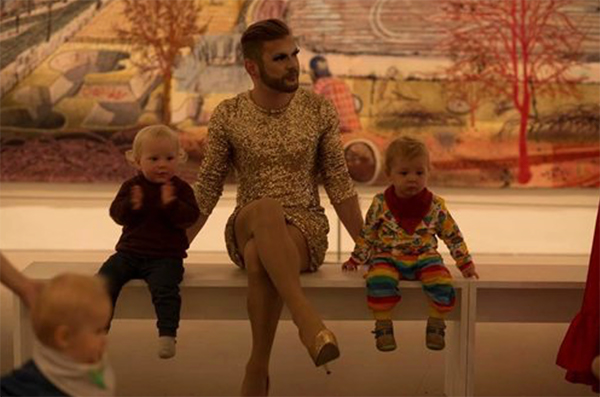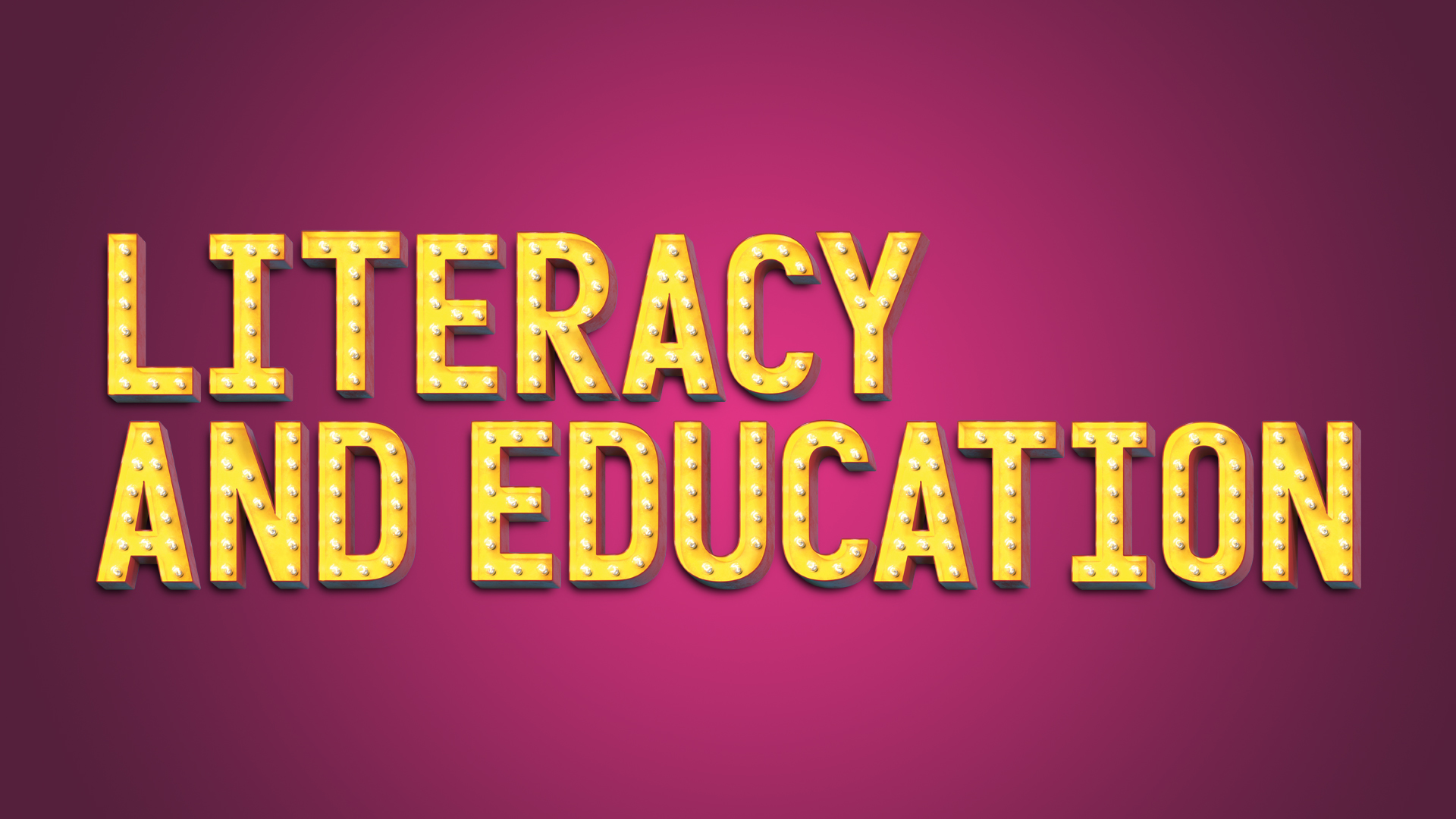Since we launched three-and-a-half years ago, we’ve performed around the UK for 18,000 children and are working with some of the most high-profile drag names in the country, like Jodie Harsh. But there’s nothing quite like seeing a four-year-old react to a drag queen for the first time, with all the glitter and wigs and ballgowns. It’s one of the most delightful feelings in the world.
That said, we’ve also been on the front page of the Daily Mail and The Sun, who aren’t necessarily fans of what we do, I’ve had death threats and people have been sending me pictures of my own front door. It’s not ideal.
Are drag performers generally keen to get involved?
They are. A lot of them grew up with Section 28 [a clause brought in by Margaret Thatcher’s government banning the promotion of homosexuality in schools] when their existence wasn’t even allowed to be talked about. Being able to walk into schools, libraries and religious festivals and do what they do and hopefully impact some of the kids so that they never have to feel how they did as a child – or the British Library, where LGBTQ authors once weren’t even allowed to be on the shelf – that means a lot.
What are your 2020 plans?
We’re fully booked until September, all over the UK. DragCon is coming to London for the first time and we’ll be there. It’s very exciting. But mainly we’re looking to continue our work, particularly with the likes of Islington and Newham councils, and we’re always looking to go into more schools and libraries.
Running Deer School
There is a range of reasons why children struggle in mainstream schools. The barriers they face can include learning, social, emotional and behavioural difficulties, ADHD, Asperger’s syndrome, oppositional defiant disorder, foetal alcohol syndrome and mental health problems. All too often, young people with these issues face temporary or permanent exclusion and can find themselves labelled a problem. For these hard-to-reach kids, Devon’s Running Deer School – supported by Big Issue Invest, our social investment arm – offers the help required to let them flourish. As well as traditional subjects such as maths, English and science, the social enterprise harnesses the therapeutic power of nature. Working outside the traditional classroom environment, they teach conservation and rural skills, green woodworking and bushcraft. At the heart of the programme is the close relationship with the school’s resident horses. Equine-assisted education and learning allows students to build relationships and develop emotional bonds based on trust and respect.
The New DeafAcademy in Exmouth
After a fundraising drive backed by The Cure, My Bloody Valentine, Mogwai and a host of other big names in music, one of Europe’s most pioneering schools for deaf children will open this year. Currently based in Exeter, the Deaf Academy gives isolated children the gift of language by teaching in English and British Sign Language (BSL). In 2018 they launched a £250,000 community appeal to move from their “crumbling” buildings to a new facility in Exmouth. Designed by deaf people, the new home will use cutting-edge architecture and technology to encourage visual communication. Rachel Goswell of the bands Slowdive and Minor Victories organised the music auction, which raised £30,000 towards the appeal. Her son Jesse is a pupil at the school and she says the new building will bring huge benefits for him. “The fact that the academy teaches BSL has been so important for Jesse, giving him the ability to communicate,” she says.
Paul Bristow, Magic Torch Comics
Greenock-based Paul Bristow leads Magic Torch Comics, a social enterprise working with schools and communities to help them tell their own stories using comics. A huge part of the mission is to boost literacy, which Bristow says comics do effectively – whether that means encouraging people to read more comics or giving them the confidence to explore other kinds of literature. Founded in 2012, Magic Torch Comics has transformed Scottish folklore into colourful comics, with other projects using comics to explore how refugees integrate into British life. The team even works regularly with groups of school children at the Scottish Parliament, creating comics with them that explain different elements of parliamentary life, such as First Minister’s Questions. Late last year the social enterprise won a grant of almost £63,000 from the Young Start Community Fund that will be used to deliver a two-year programme of free comic workshops across Inverclyde, working with groups of marginalised young people to present their perspectives, lived experiences and creativity in comics.
Tall Ships Youth Trust
How many of us have dreamed of a swashbuckling voyage on the high seas? Tall Ships Youth Trust harnesses that spirit of adventure to take disadvantaged and disabled young people on physically and mentally challenging sailing expeditions that can transform their lives in just a week. One such youngster was Josh. When he stepped aboard, aged 16, his mother had just suffered three strokes and his father was dead. He was taking care of himself at home, scared to use the heating or turn on the lights for fear of the cost. After finding renewed purpose through the challenge of sailing, Josh retook his A-levels and is now studying outdoor leadership at the University of Central Lancashire. “I found hope,” he says. In 2020 Tall Ships aims to raise £5m to add a new flagship to its fleet, which would allow the charity to help 50,000 young people over the next 20 years.
Music for All
Last year, we reported on how councils across the UK are slashing funding for music education, as demands on their squeezed budgets grow. Forty per cent of low-income families say music lessons are well beyond their budgets, so these cuts risk depriving whole communities of the life-changing power of learning an instrument. Music for All is stepping into the breach, providing free access to instruments and lessons so that melody need not be a luxury. The charity makes grants available for community music groups and educational organisations, as well as donating instruments and music tuition to individuals who need their help. The nationwide Learn to Play Days (taking place on March 28 and 29) offer people of all ages and from all backgrounds a free taster lesson on a musical instrument.
Bobby Seagull
An immediate cult star when he appeared on University Challenge in 2017, secondary school teacher Bobby Seagull has since used his unexpected celebrity to promote the joy of mathematics and the value of education. Aiming to become the “Jamie Oliver of maths”, he wants to change how we think about numbers just as the chef changed how we view healthy eating. He’s presented TV and radio shows with his quizzing rival Eric Monkman, become a columnist for the Financial Times, released regular maths challenges on Radio 4 and started the Maths Appeal podcast with Susan Okereke. Last year, he released his own book, The Life-changing Magic of Numbers, which tells his life story through maths and shows the ways equations can make sense of the world around us. Challenging the idea of a ‘maths brain’, Seagull says almost all of us can get better at the subject and discover satisfaction in numbers with a little effort and the right teacher,










